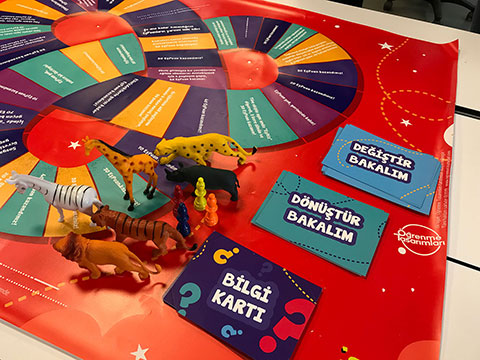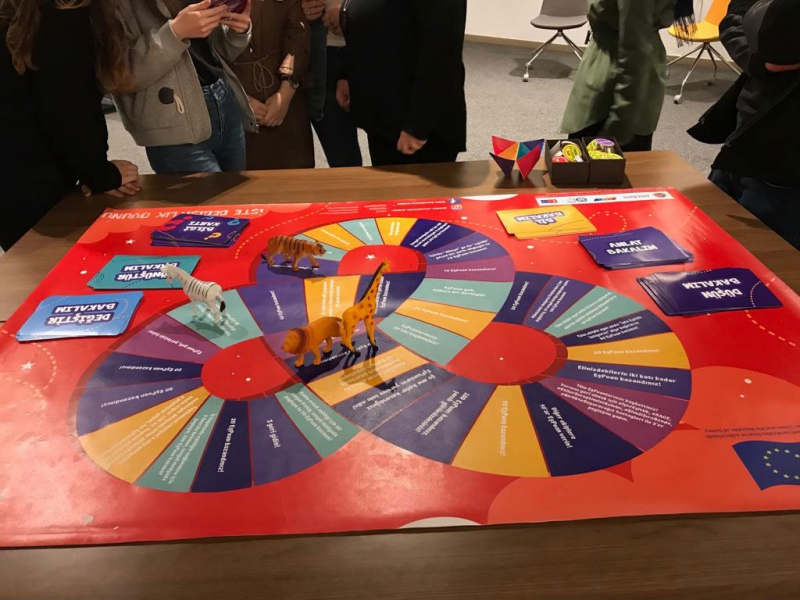ChangEquality in Work UNIVERSITY ACTIVITIES
Within the scope of the SAGE in Work project, we targeted to organize activities at 6 universities to create gender equality awareness in work life with 100 students in Istanbul.
We aimed students to think about equal access to employment, equal promotion opportunities, being part in senior management, receiving equal pay for equal job, equal political participation and representation at national and local levels, equal time usage, sharing care responsibilities equally, and to propose solutions to existing problems regarding main indicators of gender inequality as defined by EIGE and World Economic Forum.
The emotions and thoughts we ultimately want to create in the students may be summarized as follows; that women’s leadership is possible, that women can accomplish any job, that contribution of women is essential for economic development, that woman and man may be thought as the two wings of a bird and can fly higher only together, that equality can be achieved, that the sexist language and gender stereotypes can be changed, that new perspectives are possible.
ChangEquality in Work Board Game
In planning phase, we concluded that performing university activities through the gamification technique instead of a classical presentation would enhance the benefit. As a result of our research, we met Öğrenme Tasarımları, a social initiative, and their Social Equality Kit (TEK) prepared for children.
We then decided to adapt it into a new board game, we reviewed all the questions and cases, readdressed most of them in terms of 4 core domains of our project, and changed them in accordance with our target group’s level. We also added new questions and cases. We produced the game in two different sizes. We preferred giant size for the university events, and gave the box sizes to Gender Ambassadors.
We named the game “ChangEquality in Work” to express equality in work life is possible through change. In the posters of the events, we also equated the male and female symbols on the same axis.
ChangEquality in Work University Activities were designed to ensure active involvement of the participants in the training instead of placing them in a teacher-student, teller-listener setting. Through this model utilizing gamification technique, students negotiate the topics among themselves and provide and/or propose their own solutions, with the guidance and supervision of a facilitator/moderator.
The students were guided to change sexist discourses in the language, to reverse personality characteristics attributed to women and men, to think about the implications of existing gender inequality status in the world and in Turkey, and to become aware of the success stories of leading Turkish women within this interactive game.
The moderators give additional explanations, comments on the questions if they deem necessary, expand the suggestions developed by the students, support the answers with the data, ensuring that the basic knowledge about gender equality is complemented. The ChangEquality game is played with 4 groups of 2-7 people. The game consists of a board with a roadmap symbolized by the infinity sign, question or case cards and game pieces. Each group gets a game piece to move around the board. To start, they place the game piece for themselves anywhere they want on the roadmap, draw randomly one of the cards bearing the headings Let’s Think, Tell, Know, Change, or Transform. Then they discuss the questions or cases on the card among themselves and generate the group’s answer. Thereafter, comments are made altogether on the group’s answer, in some cases a new perspective is developed among all players. Each group earns EqualityPoints by moving on the board as the number written on its own card. The game lasts approximately 90-120 minutes. The group that collects the most EqualityPoints wins the game.
We gave away backpacks including notebooks on which various statistical data about equality were stated and pens to the students to thank for their interest, and to ensure that what is learnt will be remembered. The book Asi Kızlar Bilge Kadınlar (Rebel Girls, Wise Women) supporting the training content and containing the answers to some questions was also given as a gift. Moreover, we handed out Gender Equality Awareness Training Attendance Certificates on name basis by affixing the signature of the programme director.
With the idea that gender inequality is a changeable phenomenon, mostly fed by the prejudices and beliefs originating mainly from the childhood period and the family environment, we donated the TEK to secondary schools on behalf of the group or university who earned the most EqualityPoints. We delivered the games through the Soroptimist clubs by intending sustainability. Thus, we guaranteed that the game will be played for longer time with more people, and it will generate a multiplier effect.
Scheduling and Implementation of the Activities
Scheduling of the ChangEquality in Work activities started with searching for the universities where the events could be held. As of January 2019, women’s centers and student clubs of 52 universities -both state and private- located in Istanbul were listed. Student clubs such as ‘Women in Business’, ‘Social Work’, ‘Woman Studies’ were contacted. A formal letter introducing the project and the activity were sent to each student club. Universities were visited to obtain formal permissions. Student club presidents were interviewed to introduce the activity comprehensively and to organize the event. Activity scheduling was carried out with 12 universities including 9 in the spring semester and 3 in the fall semester, regarding time constraints and other project activities. However, the event at Istanbul University was cancelled as the building had been damaged during the earthquake and was closed for use.
We provided posters to each university to hang in their schools before the event and to share in available web sites, blogs, e-mail and WhatsApp groups, platforms and/or mobile apps of the universities, relevant clubs and the students accounts. We also shared the posters of all university events before and after the activities on our social media accounts.
The president of the association, project director, and the project coordinator arrived universities at least two hours before the event. The hall was prepared. Visual materials such as flags were hung at suitable places. Board, cards, game pieces, pawns and materials of the ChangEquality in Work game were prepared. Promotional materials, and the books were placed suitably in the hall. The association and project were introduced when the students came. Following the pre-test, gender equality awareness training was realized by playing the ChangEquality in Work game. The survey was repeated at the end of the game. Certificates were distributed to the attendees who signed the attendance sheets. Cookies, tea, coffee, fruit juices were offered during the activity.
Although we aimed to perform 10 training sessions with at least 100 students at total of 6 universities during the project term, we reached 340 students in 16 sessions at 11 universities. In fact, when we added the games we played with our Club members, participants of Mentorship Programme, trainees of the KIMIM project and scholars of our association, the number of players exceeds 400. We surprisingly received various ChangEquality in Work activity requests from different cities such as Isparta, Ankara, Mardin, Gaziantep, and even from Güzelyurt (METU Campus), Cyprus.
ChangEquality in Work University Activities
April 11 Istanbul Medeniyet University, Philosophy Club, 10 students
April 16 Beykoz University, Women’s Club, 2 sessions, 42 students
April 17 Bahçeşehir University, International Law Club, 8 students
April 22 Istanbul Medipol University, Social Service Department, 22 students
April 30 Istanbul Ayvansaray University, Child Development Club, 2 sessions, 39 students
May 6 Marmara University, Entrepreneur Women’s Club, 28 students
May 10 Istanbul Aydın University, Women in Business Club, 30 students
May 17 İstinye University, Social Service Department, 2 sessions, 47 students
August 29 SI Turkey Kuşadası Youth Camp, 28 female students from different universities
October 17 Yeditepe University, Women in Business Club, 2 sessions, 42 students
November 29 Galatasaray University, Women in Business Club, 15 students
Activity Assessment Method
Outcomes of the ChangEquality in Work university activities which were organized to raise or reinforce awareness on gender equality in work life among university students were assessed both quantitatively and qualitatively.
The project coordinator, who is one of the moderators of the events, participated in each event to make qualitative assessments based on observations and impressions. Continuity in observations, a collective registration for all activities, and comparison of the knowledge and interest levels of the students among the universities were ensured by this way.
The quantitative assessment with the pre-andpost-tests directed to students was yielded objective results about effectiveness. A short survey containing the exactly the same set of 10 questions was prepared to be used as pre-and-post tests. This survey questioned the students’ general gender equality awareness level and their knowledge concerning the respective basic indicators. When the pre-test was distributed, students was specifically asked to answer the questions as far as they know without consulting each other or electronic information sources. In this way, real knowledge and awareness levels regarding gender equality were tried to be measured.
The quantitative assessment based on survey results was set forth in detail in here whereas the observation-based qualitative assessment was included in the relevant university’s sections.
ChangEquality Game
Photo Gallery








